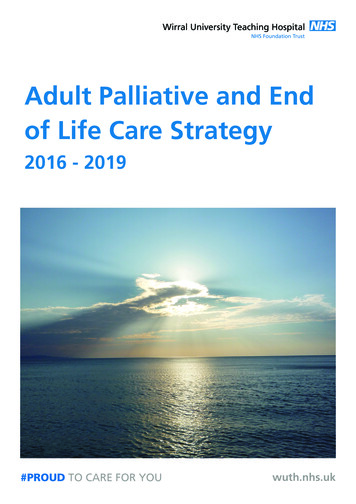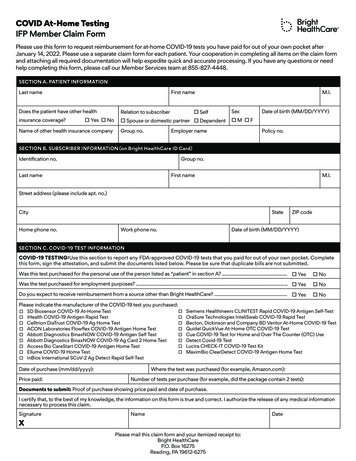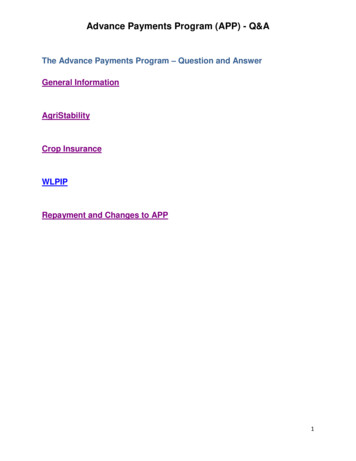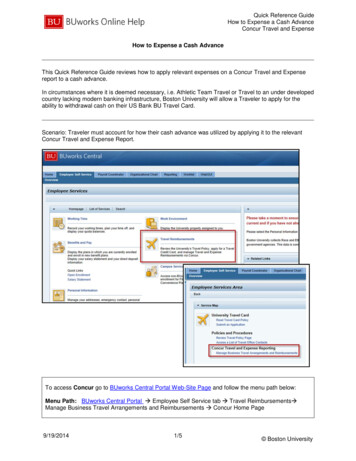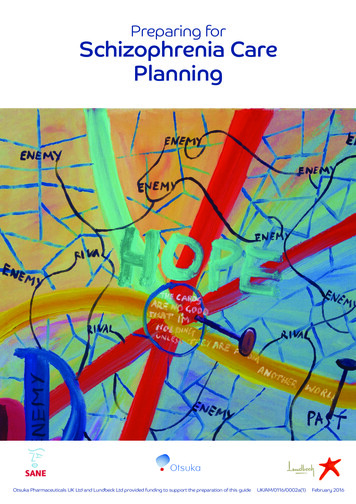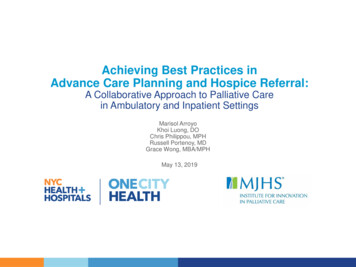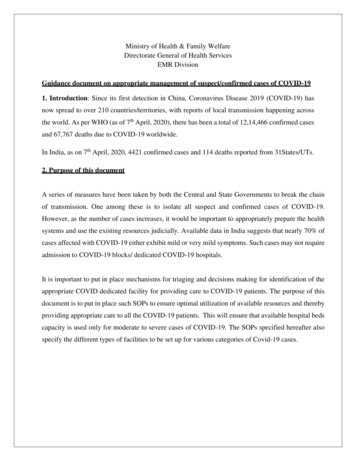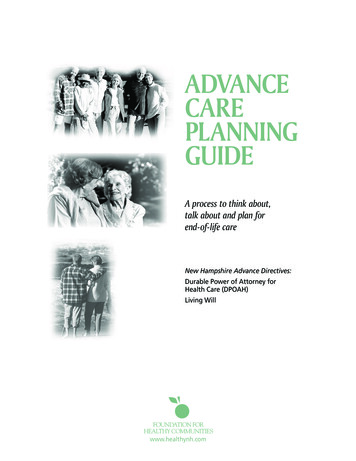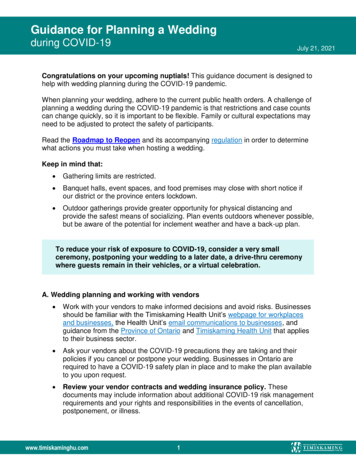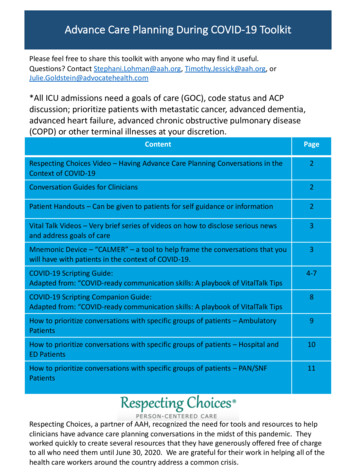
Transcription
Advance Care Planning During COVID-19 ToolkitPlease feel free to share this toolkit with anyone who may find it useful.Questions? Contact Stephani.Lohman@aah.org, Timothy.Jessick@aah.org, orJulie.Goldstein@advocatehealth.com*All ICU admissions need a goals of care (GOC), code status and ACPdiscussion; prioritize patients with metastatic cancer, advanced dementia,advanced heart failure, advanced chronic obstructive pulmonary disease(COPD) or other terminal illnesses at your discretion.ContentPageRespecting Choices Video – Having Advance Care Planning Conversations in theContext of COVID-192Conversation Guides for Clinicians2Patient Handouts – Can be given to patients for self guidance or information2Vital Talk Videos – Very brief series of videos on how to disclose serious newsand address goals of care3Mnemonic Device – “CALMER” – a tool to help frame the conversations that youwill have with patients in the context of COVID-19.3COVID-19 Scripting Guide:Adapted from: “COVID-ready communication skills: A playbook of VitalTalk Tips4-7COVID-19 Scripting Companion Guide:Adapted from: “COVID-ready communication skills: A playbook of VitalTalk Tips8How to prioritize conversations with specific groups of patients – AmbulatoryPatients9How to prioritize conversations with specific groups of patients – Hospital andED Patients10How to prioritize conversations with specific groups of patients – PAN/SNFPatients11Respecting Choices, a partner of AAH, recognized the need for tools and resources to helpclinicians have advance care planning conversations in the midst of this pandemic. Theyworked quickly to create several resources that they have generously offered free of chargeto all who need them until June 30, 2020. We are grateful for their work in helping all of thehealth care workers around the country address a common crisis.
Resources - Having Advance Care Planning Conversations duringCOVID-19 RECORDED WEBINAR: How to Have a Proactive care planning conversation in the contextof COVID-19 Please watch this prior to having conversations with patients. This 26 minute video can bewatched at 1.25 playback speed without negative effects. You will need to have thedecision aids and tools listed below. Tools to support specific treatment decisions in high risk individuals These tools are used to assist patients in deciding their wishes for CPR, Ventilators, andBiPap. Decision Aid: CPR Decision Aid: Help with Breathing User Guide for Decision Aids This is a written user guide for how to use the decision aids.Once you have watched the video, here are a few other resources from Respecting Choicesthat can be helpful during advance care planning conversations. Proactive care planning conversation COVID-19 – for clinicians to have conversation withindividual at high risk for COVID-19 complications A 4-page PDF document for clinicians that will walk you through having a conversation witha patient under investigation or positive for COVID-19. Proactive care planning conversation with HC Agents COVID-19 – for clinicians to haveconversations with the Healthcare Agent of individuals at high risk for COVID-19complications A 4-page PDF document for clinicians that will walk you through having a conversation witha patient’s agent/substitute decision maker when the patient is under investigation orpositive for COVID-19. Medical Priorities and Treatment Options – this tool is for use only in the context of aclinician-facilitated discussion about care planning (NOT to be used as a stand-alonepiece) This is a 1-page document that is intended to be given to the patient or agent to read alongwith you during the conversation. This is not a stand alone document and it does not matchthe language in the AAH current selective code status order set. Use with caution andensure you are accurately capturing the patient’s wishes.These resources can be given to our patients at high risk of COVID-19 infection to highlightthe importance of sharing their treatment preferences before a medical crisis. Whensharing these resources with patients, please use the following scripting:We know that this pandemic can be scary. There are so many things that we cannotcontrol. So, to help you focus on what you can control, we want to give you someresources to help you make a plan for your medical care if you were unable to speak foryourself. Creating a plan makes it easier for you, and your loved ones, to be confident thatyou will receive the care that you want, whenever possible. Proactive Care Planning for COVID-19. A Guide for High Risk Adults Proactive Care Planning for COVID-19. A Guide for Healthcare AgentsPlease contact Stephani Lohman, Tim Jessick, or Julie Goldstein with questions.
Resources - Having Advance Care Planning Conversations duringCOVID-19Resources from Vital Talk – a series of very short videos (2 minutes or less) Chapter: Disclose Serious News Please watch: Giving Serious News Using I Wish Chapter: Address Goals of Care Please watch: Discussing ACP in Clinic (could be for home or SNF patients, as well) Discussing Code Status with a Hospitalized Patient Discussing Patient Goals with a Surrogate Responding to “I Want to Live as Long as I Can” What’s Most ImportantTo help you frame this conversation, here is a useful mnemonic device from Vital Talk:“CALMER” Check in Ask about COVID “What have you been thinking about COVID and your situation?”(Just listen) “Here is something I want us to be prepared for.” / “You mentioned COVID. I agree.”“Is there anything you want us to know if you got COVID / if your COVID gets really bad?Lay out issuesMotivate them to choose a proxy and talk about what matters Take a deep breath (yourself!).“How are you doing with all this?” (Take their emotional temperature.)“If things took a turn for the worse, what you say now can help your family / loved ones”“Who is your backup person--who helps us make decisions if you can’t speak? Who else? (having 2 backuppeople is best)“We’re in an extraordinary situation. Given that, what matters to you? (About any part of your life? About yourhealth care?)Make a recommendation--if they would be able to hear it. “Based on what I’ve heard, I’d recommend [this].What do you think?”Expect emotion Watch for this – acknowledge at any point“This can be hard to think about.” Any documentation – even brief -- will help your colleagues and your patient“I’ll write what you said in the chart. It’s really helpful, thank you.” Record the discussion When using Epic, use the existing .GOC or .ACP smartphrases to record yourconversations. When using any other EMR, document using a progress note.Please contact Stephani Lohman, Tim Jessick, or Julie Goldstein with questions.
Resources - Having Advance Care Planning Conversations duringCOVID-19COVID-19 Scripting & Companion Guide:Adapted from: “COVID-ready communication skills: A playbook of VitalTalk Tips”Scripting:ScreeningWhen someone is worried they might be infectedWhat they sayWhat you sayWhy aren’t they testing everybody?We don’t have enough test kits. I wish it were different.Why do the tests take so long?The lab is doing them as fast as they can. I know it’s hard to wait.How come the basketball playersgot tested?I don’t know the details, but what I can tell you is that was a different time. The situation is changingso fast that what we did a week ago is not what we are doing today.PreferencingWhen someone may want to opt out of hospitalizationWhat they sayWhat you sayI am worried about this new virus.What should I be doing?You are right to be concerned. Here’s what you can do. Please limit your contact with others—wecall it social distancing. Then you should pick a person who knows you well enough to talk todoctors for you if you did get really sick. That person is your proxy. Finally, if you are the kind ofperson who would say, no thanks, I don’t want to go to the hospital and end up dying on machines,you should tell us and your proxy.I realize that I’m not doing wellmedically even without this newvirus. I want to take my chances athome / in this long-term carefacility.Thank you for telling me that. What I am hearing is that you would rather not go to the hospital ifwe suspected that you have the virus. Did I get that right?I don’t want to come to the end ofmy life like a vegetable being keptalive on a machine. [in a long termcare facility or at home]I respect that. Here’s what I’d like to propose. We will continue to take care of you. The best case isthat you don’t get the virus. The worst case is that you get the virus despite our precautions—andthen we will keep you here and make sure you are comfortable for as long as you are with us.I am this person’s proxy / healthcare agent. I know their medicalcondition is bad—that theyprobably wouldn’t survive the virus.Do you have to take them to thehospital?It is so helpful for you to speak for them, thank you. If their medical condition did get worse, wecould arrange for hospice (or palliative care) to see them where they are. We can hope for the bestand plan for the worst.
Resources - Having Advance Care Planning Conversations duringCOVID-19COVID-19 Scripting & Companion Guide:Adapted from: “COVID-ready communication skills: A playbook of VitalTalk Tips”Scripting:TriagingWhen you’re deciding where a patient should goWhat they sayWhat you sayWhy shouldn’t I just go to thehospital?Our primary concern is your safety. We are trying to organize how people come in.Please fill out the questions online. You can help speed up the process for yourself andeveryone else.Why are you keeping me out ofthe hospital?I imagine you are worried and want the best possible care. Right now, unless youreally, really need it, being in the hospital could mean a higher risk of you gettinginfected. The safest thing for you is to .AdmittingWhen your patient needs the hospital or the ICUWhat they sayWhat you sayDoes this mean I haveCOVID19?We will need to test you for the virus, and we will know the result by tomorrow. It isnormal to feel stressed when you are waiting for results, so do things that help youkeep your balance.How bad is this?From the information I have now and from my exam, your situation is serious enoughthat you should be in the hospital. We will know more in the next day, and we willupdate you.Is my grandfather going tomake it?I imagine you are scared. Here’s what I can say: because he is 90, and is already dealingwith other illnesses, it is quite possible that he will not make it out of the hospital.Honestly, it is too soon to say for certain.Are you saying that no one canvisit me?I know it is hard to not have visitors. The risk of spreading the virus is so high that I amsorry to say we cannot allow visitors. Visitors would be at higher risk of getting sickthemselves if they come into the hospital. I wish things were different. You can useyour phone, although I realize that is not quite the same.How can you not let me in for avisit?The risk of spreading the virus is so high that I am sorry to say we cannot allow visitors.We can help you be in contact electronically. I wish I could let you visit, because I knowit’s important, but it is not possible now. Sadly, it is not possible now.
Resources - Having Advance Care Planning Conversations duringCOVID-19COVID-19 Scripting & Companion Guide:Adapted from: “COVID-ready communication skills: A playbook of VitalTalk Tips”Scripting:CounselingWhen coping needs a boost, or emotions are running highWhat they sayWhat you sayI’m scared.This is such a tough situation. I think anyone would be scared. Could you share more withme?I need some hope.Tell me about the things you are hoping for? I want to understand more.You people are incompetent!I can see why you are not happy with things. I am willing to do what is in my power toimprove things for you. What could I do that would help?I want to talk to your boss.I can see you are frustrated. I will ask my boss to come by as soon as they can. Pleaserealize that they are juggling many things right now.Do I need to say my goodbyes?I'm hoping that's not the case. And I worry time could indeed be short. What mostpressing on your mind?DecidingWhen things aren’t going well, goals of care, code statusWhat they sayWhat you sayI want everything possible. Iwant to live.We are doing everything we can. This is a tough situation. Could we step back for amoment so I can learn more about you? What do I need to know about you to do abetter job taking care of you?I don’t think my spouse wouldhave wanted this.Well, let’s pause and talk about what they would have wanted. Can you tell me what theyconsidered most important in his life? What meant the most to him, gave his lifemeaning?I don't want to end up being avegetable or on a machine.Thank you, it is very important for me to know that. Can you say more about what youmean?I am not sure what my spousewanted—we never spoke aboutit.You know, many people find themselves in the same boat. This is a hard situation. To behonest, given their overall condition now, if we need to put them on a breathing machineor do CPR, will not make it. The odds are just against him. My recommendation is that weaccept that they will not live much longer and allow them to pass on peacefully. I knowthat is hard to hear. What do you think?
Resources - Having Advance Care Planning Conversations duringCOVID-19COVID-19 Scripting & Companion Guide:Adapted from: “COVID-ready communication skills: A playbook of VitalTalk Tips”Scripting:AnticipatingWhen you’re worrying about what might happenWhat you fearWhat you can doThat patient’s son is going to be veryangry.Before you go in the room, take a moment for one deep breath. What’s the anger about? Love,responsibility, fear?I don't know how to tell thisadorable grandmother that I can’tput her in the ICU and that she isgoing to die.Remember what you can do: you can hear what she’s concerned about, you can explain what’shappening, you can help her prepare, you can be present. These are gifts.I have been working all day withinfected people and I am worried Icould be passing this on to thepeople who matter most.Talk to them about what you are worried about. You can decide together about what is best. Thereare no simple answers. But worries are easier to bear when you share them.I am afraid of burnout, and of losingmy heart.Can you look for moments every day where you connect with someone, share something, enjoysomething? It is possible to find little pockets of peace even in the middle of a maelstrom.I’m worried that I will beoverwhelmed and that I won’t beable to do what is really the best formy patients.Check your own state of being, even if you only have a moment. If one extreme is wiped out, and theother is feeling strong, where am I now? Remember that whatever your own state, that thesefeelings are inextricable to our human condition. Can you accept them, not try to push them away,and then decide what you need.GrievingWhen you’ve lost someoneWhat I’m thinkingWhat you can doI should have been able to save thatperson.Notice: am I grading myself? Could I step back and just feel? Maybe it’s sadness, or frustration, orjust fatigue. Those feelings are normal. And these times are distinctly abnormal.OMG I cannot believe we don’t havethe right equipment / how meanthat person was to me / howeverything I do seems like it’sblowing upNotice: am I catastrophizing? Is all this analyzing really about something else? Like how sad this is,how powerless I feel, how puny our efforts look? Under these conditions, such thoughts are to beexpected. But we don’t have to let them suck us under. Can we notice them, and feel them, maybeshare them?And then ask ourselves: can I step into a less reactive, more balanced place even as I move into thenext thing?
Resources - Having Advance Care Planning Conversations duringCOVID-19Companion GuideWhy is a scripted communication skills primer needed?Many of our Team Members may need to be involved in difficult and complicated discussions with ourpatients and their families in many different settings. These scripted tools provide some helpfulresponses to potential questions from our patients, their families and maybe other Team Members.How do we use this guide? Remember that our current situation can be very stressful for everyone. This scripting can cause verystrong emotional responses from our Team Members. We would suggest that local leaders share and, time permitting, discuss this script with their team. Prepare your team that they may have an emotional response to some of this content matter; providesupport and guidance as needed. Suggest that this is a tool to help our Team Members respond to potential tough questions andemotions. You may want to remove certain sections of this tool if it is not pertinent to your team. We want tolimit as much stress on team members as possible. Always provide support and offer debriefing as needed after some of these difficult discussions.Who needs to be aware of the different scripting tool sections? Screening Section: When testing for COVID19 is on someone’s agenda Front line caregivers, nurses, physicians, APC’s, telephone triage nurses, drive by testing booth attendants Call center or triage nurses, drive by testing booth attendants, ED triage nurses Triaging Section: When you are deciding where a patient should go Admitting Section: When your patient needs the hospital, or the ICU ED staff, Hospitalist team, Patient Relations, Security Counseling Section: When coping needs a boost, or emotions run high Frontline caregivers, nurses, physicians, APC’s, telephone triage nurses, drive by testing booth nurses, Patient Relations Deciding Section: When things aren’t going well, goals of care, code status ED, Hospital, ICU, SNF staff, Ethics team, Palliative Care team, Chaplains, Social Workers ED, Hospital, ICU, SNF staff, Ethics team, Palliative Care team, Chaplains, Social Workers, Patient Relations, Security ED, Hospital, ICU, SNF staff, Ethics team, Palliative Care team, Chaplains, Social Workers Anticipating Section: When you are worrying about what might happen Grieving Section: When you’ve lost someoneAny questions or concerns can be directed to the Advocate Aurora Health Advance CarePlanning/Shared Decision Making in Serious Illness Program Owners:Dr. Julie Goldstein(Julie.goldstein@advocatehealth.com)Dr. Tim Jessick(timothy.jessick@aah.org)Stephani Lohman (Stephani.lohman@aah.org)We would like to express our deepest appreciation for all of the care and compassion that you provide.
Advance Care Planning During COVID-19 ToolkitPatients from Ambulatory Care ClinicsAcute-onChronic orChronicAdvancedIllness/FrailtyPriority for documentation of substitute decision-maker/POA, discussionof goals of care, and POLST or community DNR completion. Discusshospitalization preferences and appropriateness.Provider education to patient/family of limited benefit of resuscitationand high risk of poor outcomes with advanced measures in seriousillness. Make medical recommendations for those treatments likely to bebeneficial, but against those expected to be non-beneficial.Consider telemedicine discussions with high-risk patients/families ifdiscussion and documentation not already completed.Refer to Palliative Care clinic (if available) if goals incongruent withexpected outcomes.Refer directly to Hospice if prognosis expected to be less than 6 monthsand comfort-focused goals.StableChronicDiseaseEncourage Advance Care Planning, including substitute decisionmaker/POA and Advance Directive completionMild Diseaseor HealthyPatientsEncourage Advance Care Planning, including substitute decisionmaker/POA and Advance Directive completionNext priority level of education and telemedicine visits/documentation.
Advance Care Planning During COVID-19 ToolkitPatients in the Emergency Department or HospitalImminentlyDyingClarification of substitute decision-maker.Education to family re natural death and RECOMMEND DNR, Comfortfocused treatment.Discuss home transition vs hospitalization.If admission necessary, call Palliative Care MD.If can discharge to home, call Hospice, complete POLST orcommunity DNR.Call Palliative Care MD if needed.Acute onChronic OrAdvancedIllness (NotImminentlyDying, But IllEnough ForAdmission)Clarify substitute decision-maker.Code status/goals of care discussion by most qualified provider.Education to patients/families of limited benefit of resuscitation andhigh risk of poor outcomes with advanced measures in seriousillness. Make medical recommendations for those treatments likelyto be beneficial, but against those expected to be non-beneficial.Discuss appropriateness of admission (ICU vs non-ICU) vs dischargeto home.Palliative Care consultation if goals incongruent with expectedoutcome; high risk of intubation; or symptom needs.Re-evaluation of code status as patient’s medical condition changesOngoing recommendations for expected beneficial treatment andagainst non-expected treatments.Palliative Care Consultation for family support, symptom needs.If patient able to be discharged, complete POLST or community DNR,POA-HC prior to home discharge.Acute Illnessbut BaselineMedicallyHealthy(Admitted orClarify substitute decision-maker.Encourage Advance Directive, POA-HC completion.
Advance Care Planning During COVID-19 ToolkitPatients in the PAN/SNF CommunityAll PatientsDiscussion & documentation of substitute medical decision-maker, goalsof care, code status, and POLST, if able.Clarify “do-not-transfer” to hospital preferences for those patients thatare DNR/Comfort-Focused Treatment and DNR/Selected Interventions.Consider home transition, if able, or who have a POLST or communityDNR.Prioritize provider education to currently “full code” patients/familiesregarding the limited benefit of resuscitation and high risk of pooroutcomes with advanced measures in serious illness.Make medical recommendations for those treatments likely to bebeneficial, but against those expected to be non-beneficial.Refer to Palliative Care (if available) if goals incongruent with expectedoutcomes.Refer directly to Hospice if prognosis expected to be less than 6 monthsand comfort-focused goals.
Vital Talk Videos -Very brief series of videos on how to disclose serious news and address goals of care 3 Mnemonic Device -"CALMER" -a tool to help frame the conversations that you will have with patients in the context of COVID-19. 3 COVID-19 Scripting Guide: Adapted from: "COVID-ready communication skills: A playbook of .

